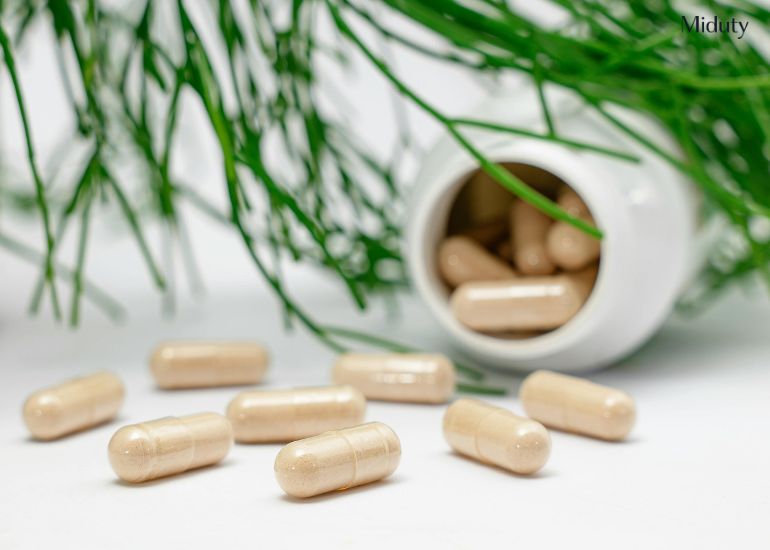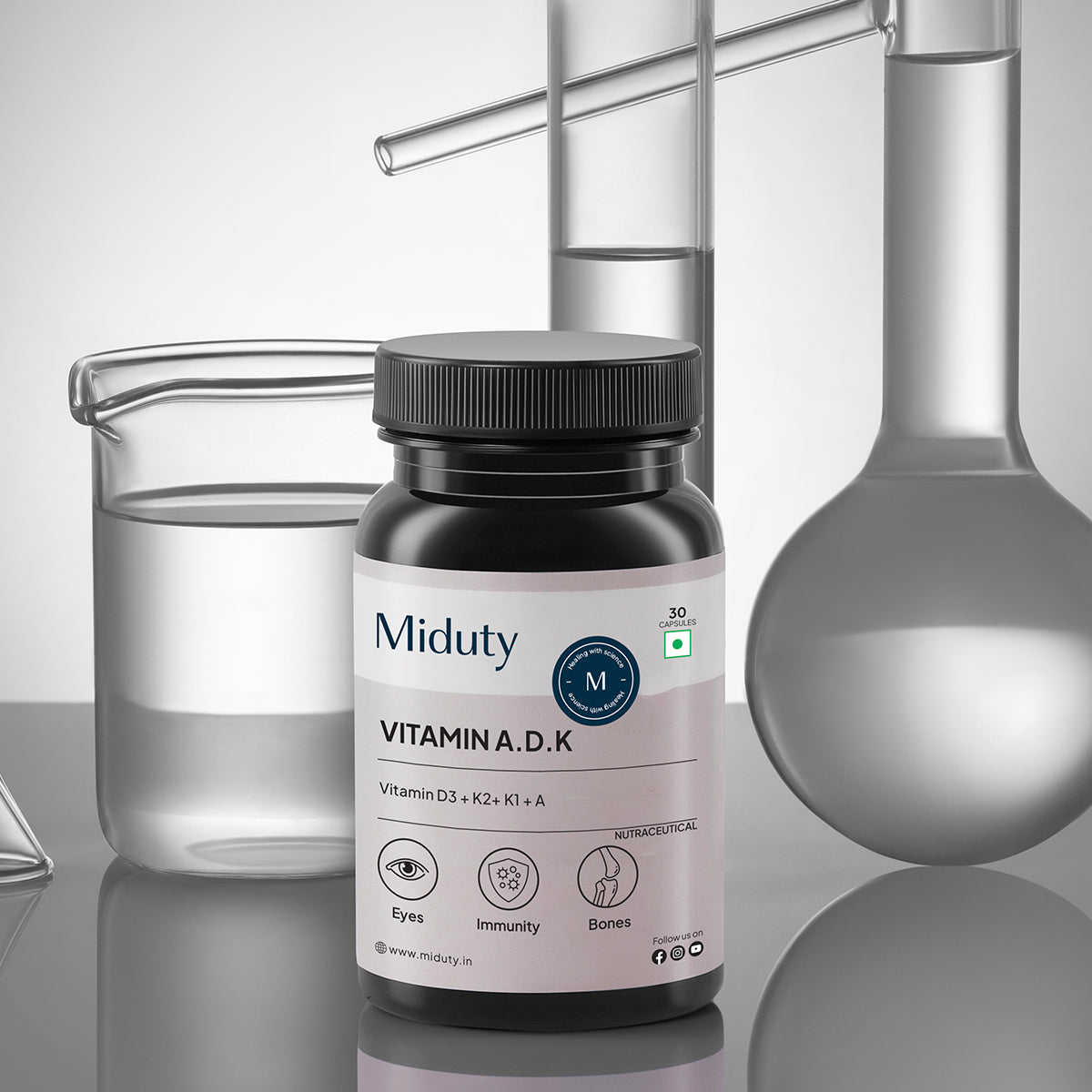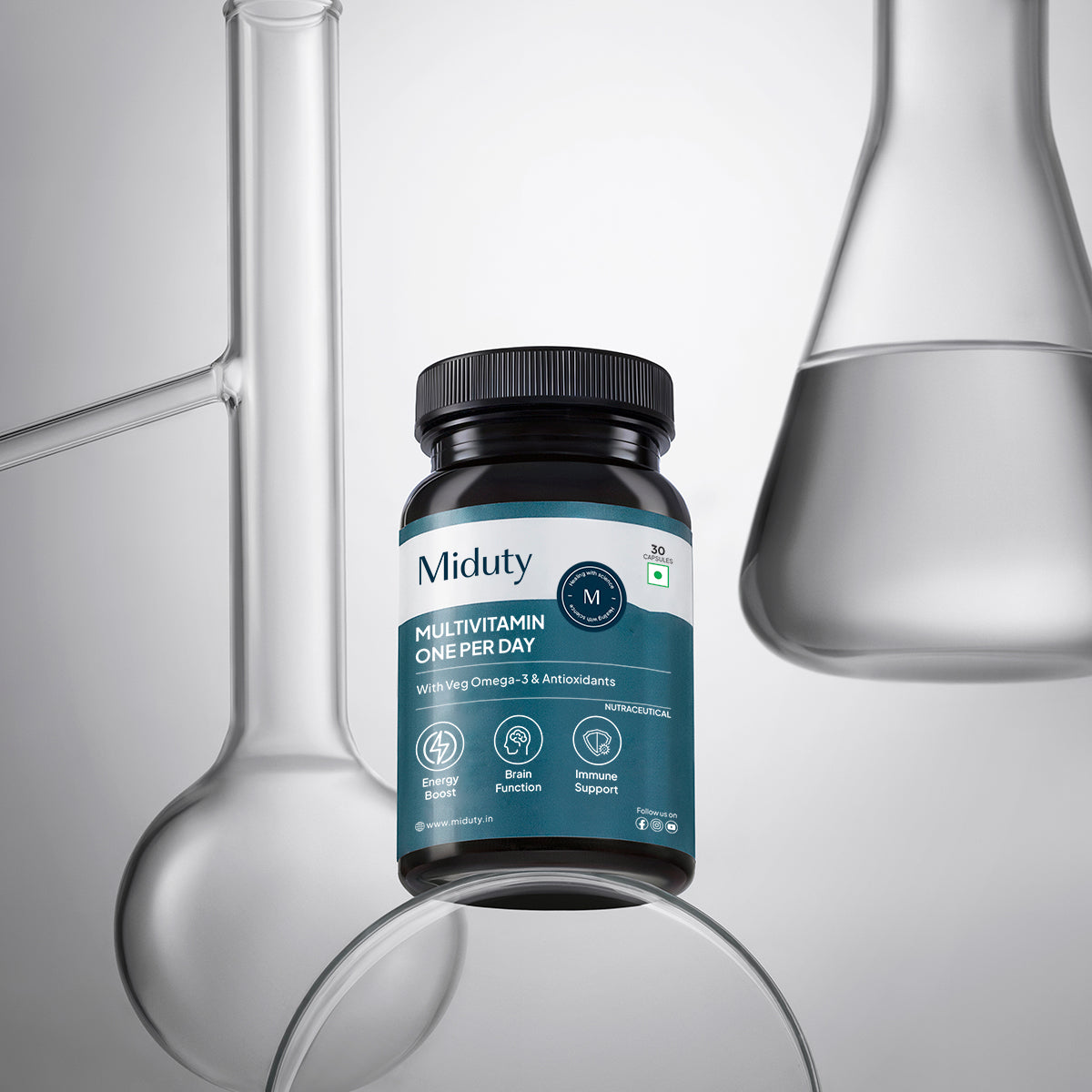
8 Signs and Symptoms of Vitamin D3 and Vitamin B12 Deficiency You Shouldn’t Ignore
Have you been feeling constantly drained, foggy, or unusually achy without a clear reason? You might be dealing with a deficiency in essential nutrients, particularly Vitamin D3 and B12. These two vitamins play a vital role in keeping your body and mind in top shape. Yet, millions of people worldwide are walking around unknowingly deficient. Sedentary indoor lifestyles, poor diet choices, and certain health conditions are fueling this silent epidemic. When these deficiencies go undetected, they can trigger a cascade of unpleasant symptoms, making daily life feel like a struggle. So how do you know if your body is lacking these crucial nutrients? Let's explore the key signs of Vitamin D3 and B12 deficiency and what you can do about them.
Key Takeaways
1. Your Fatigue Might Be More Than Just Stress: Persistent tiredness, mood swings, and brain fog could be early warning signs of Vitamin D3 or B12 deficiency—don't ignore what your body is trying to tell you.
2. Sunshine and Salmon Aren't Just for Summer: A lack of sun exposure and a poor diet are major causes of Vitamin D3 deficiency. Fatty fish, egg yolks, and sunlight are simple but powerful ways to boost your levels.
3. Vegans, Watch Your B12: Vitamin B12 is mainly found in animal products, making deficiencies common among vegetarians and vegans. Fortified foods or supplements are a must to stay energized and focused.
4. One Deficiency, Many Symptoms: Tingling, pale skin, and memory loss? These might not be separate issues—they could all be linked to a B12 deficiency affecting your nervous system.
5. Prevention is Power: A well-balanced diet, daily sun exposure, and smart supplementation can prevent years of health problems caused by unnoticed vitamin deficiencies.
What Are Vitamin D3 and B12?
Vitamin D3, also known as cholecalciferol, is a fat-soluble vitamin that your body produces when exposed to sunlight. It's essential for calcium absorption, immune system support, and muscle function. Low D3 levels can lead to weak bones, muscle pain, and even mood disorders.
Vitamin B12, or cobalamin, is a water-soluble vitamin that's crucial for nerve health, brain function, and red blood cell production. It's primarily found in animal products, which means vegans and vegetarians are at higher risk of deficiency. Without enough B12, you may experience nerve damage, cognitive decline, and severe fatigue.
Common Causes of Vitamin B12 and D3 Deficiency
Vitamin D3 deficiency often stems from limited sun exposure, darker skin tones (which reduce vitamin D synthesis), living in northern latitudes, or always wearing sunscreen. Health conditions like obesity, kidney or liver disease, and digestive disorders can also interfere with Vitamin D3 absorption.
Vitamin B12 deficiency typically results from poor dietary intake, especially in people who avoid animal products. It can also occur due to malabsorption issues linked to aging, gastrointestinal surgeries, or conditions like pernicious anemia and atrophic gastritis.
Signs and Symptoms of Vitamin D3 Deficiency
1. Persistent Fatigue and Low Energy
Fatigue is one of the most overlooked symptoms of low Vitamin D3. You may feel constantly tired, even after sleeping well. This occurs because D3 influences energy production in your cells. When your levels are low, everything feels like a chore.
2. Bone and Back Pain
Vitamin D3 is crucial for calcium absorption, and without it, bones can weaken. This often leads to dull, aching pain in your bones and lower back. If you frequently experience stiffness or discomfort in your joints or spine, it might be time to check your D3 levels.
3. Mood Changes and Depression
Vitamin D3 plays a role in regulating serotonin, the "feel-good" hormone. Low levels can lead to mood swings, irritability, or even full-blown depression. If your mental health has taken a dip for no clear reason, a lack of sunshine might be the culprit.
4. Muscle Pain and Weakness
Low D3 levels are known to cause muscle pain, cramps, and weakness. You might notice you tire quickly during exercise, struggle to carry groceries, or experience nighttime leg cramps. These signs often improve quickly with supplementation.
Signs and Symptoms of Vitamin B12 Deficiency
1. Numbness and Tingling
One of the earliest signs of B12 deficiency is tingling or numbness in the hands and feet. This happens because B12 supports the protective covering of your nerves. Without it, nerve signals get disrupted.
2. Pale or Yellowish Skin
B12 deficiency can interfere with red blood cell production, leading to anemia. This may cause your skin to appear pale or even slightly yellow due to a buildup of bilirubin from broken cells.
3. Mouth Issues
Swollen tongue (glossitis), mouth ulcers, and cracked lips are all signs of low B12. These symptoms can make eating uncomfortable and may also affect your taste.
4. Memory Loss or Brain Fog
Cognitive symptoms like forgetfulness, difficulty concentrating, and mental fog are red flags of a B12 deficiency. Severe cases can even mimic dementia, especially in older adults.
Overlapping Symptoms of Both Deficiencies
Vitamin D3 and B12 deficiencies can sometimes present overlapping symptoms, making it hard to distinguish between the two without proper testing. Both can cause:
- Chronic fatigue and low energy
- Mood swings, irritability, or depression
- Muscle weakness and body aches
- Cognitive difficulties like brain fog or poor concentration
Because they play such different roles in your body but affect overlapping systems (like the nervous system and energy production), it's possible to have both deficiencies at the same time. This is especially true for older adults, vegetarians, people with gastrointestinal conditions, and those with limited sun exposure.
Identifying these shared symptoms early and understanding their root cause can prevent years of unnecessary suffering.
Prevention and Treatment Options
Preventing and treating Vitamin D3 and B12 deficiencies requires a thoughtful combination of dietary changes, supplementation, and healthy lifestyle choices. A well-balanced diet is the first line of defense.
For Vitamin D3, incorporate fatty fish such as salmon and mackerel, which are among the richest natural sources. Egg yolks also provide a modest amount, while fortified dairy products and breakfast cereals offer an easy and accessible way to boost intake. Additionally, mushrooms that have been exposed to sunlight can be a valuable plant-based source of Vitamin D3.
To boost Vitamin B12 levels, include meat, poultry, and fish in your meals, along with dairy products like milk, cheese, and yogurt. Eggs are another excellent source. For those following a vegetarian or vegan diet, fortified plant-based milks and cereals are essential alternatives.
When diet alone isn't enough, daily supplements of 1,000–5,000 IU of Vitamin D3 and chewable B12 tablets or injections can help. Regular sun exposure, avoiding smoking, limiting alcohol, and managing chronic conditions like diabetes or thyroid disorders further support optimal vitamin absorption and balance.
Conclusion
Vitamin D3 and B12 are more than just nutrients—they're the foundation of your body's energy, mood, and strength. When your body doesn't get enough, it speaks to you through signs like fatigue, pain, numbness, and brain fog. Don't ignore these messages. Getting tested and making a few lifestyle changes can restore your health and help you feel like yourself again. Listen to your body, stay informed, and take action—it's the simplest way to live better.
Frequently Asked Questions on Vitamin B12 and D3 Deficiency -
Q1 - What happens if vitamin B12 and D3 is low?
Low levels of Vitamin B12 and Vitamin D3 can contribute to various health problems, affecting energy, mood, and physical performance. These deficiencies may lead to fatigue, muscle weakness, memory issues, and negatively impact mental well-being.
Q2 - How to overcome B12 and D3 deficiency?
To combat Vitamin B12 and D3 deficiencies, adjust your diet and consider supplements with medical guidance. Eat more B12-rich foods like meat, fish, eggs, dairy, or fortified cereals. For Vitamin D, get regular sunlight and include sources like fatty fish, egg yolks, and fortified foods. Always consult a doctor for proper dosage and to check for absorption issues.
Q3 - How can I increase my B12 and D3 naturally?
To naturally boost your Vitamin B12 and D3 levels, include more animal products, fortified foods, and sunlight in your routine. B12 is mainly found in meat, fish, eggs, and dairy, while D3 comes from sunlight, fatty fish, egg yolks, and fortified sources.
Q4 - Can I take vitamin B12 and D3 together?
Yes, you can take Vitamin B12 and Vitamin D3 together. There are no known negative interactions between them, and they are often combined in multivitamin supplements. Just make sure you're taking them in the right doses, ideally under the guidance of a healthcare provider—especially if you're treating a deficiency or have any underlying health conditions.
Q5 - What is the best time to take D3 and B12?
The best time to take Vitamin D and B12 supplements is usually in the morning with a meal. Vitamin D is fat-soluble and absorbs best when taken with food that contains fat. Vitamin B12 can be taken with or without food, but some people may find it gentler on the stomach when taken with a meal.
References












